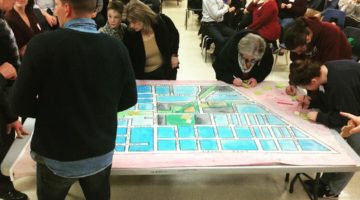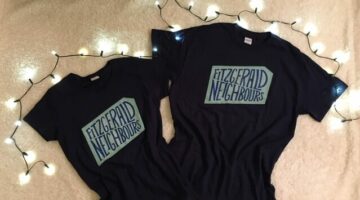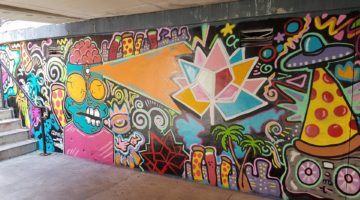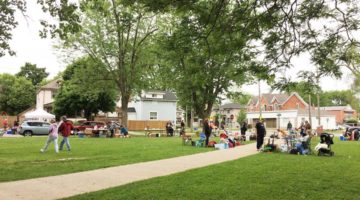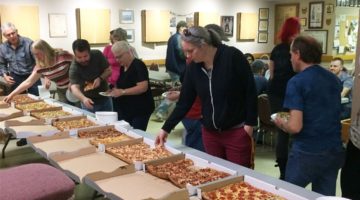Written by Suzanne Veenstra (co-chair of Fitzgerald Neighbours)
Covid-19 came as a shock to me. The week before March Break, I heard rumblings about a virus but didn’t really think anything of it. There was some office chatter about whether we should be cancelling our March Break travel plans and we kinda smirked at people for being “dramatic.”
And then it hit home and fast. The closures were swift and widespread. The initial three-week timeline, as we all know, was just the beginning of our current journey.
As someone working in the field of community development, 95% of my work involves bringing people together, facilitating committees and meetings and building relationships with volunteers and neighbours…in physical spaces. With the “stay at home” orders in place, I was forced to ask myself, “what does community mean when we can’t be in the same physical spaces? How do we build community when we can’t get together?”
The pandemic invited me to take a step back and question my very definition of community. If my definition is confined to bringing people together physically, how do I experience community when we are isolated from one another? Yes we can chat online and do zoom meet-ups, but how does isolation change my understanding of what makes communities tick?
Over the past two months, Covid-19 has challenged me to see that community is not simply the coming together of people in shared spaces, it also requires those people to choose empathy.
Community in Isolation
Pre-Covid, my primary definition of community involved bringing people together. Our Fitz events are a great example of that- garage sales, trivia nights, Fitzmas parties, porch sing-a-longs. This type of community building also happens at the playground, stopping to chat on the sidewalk or joining your neighbour on their porch for a drink. We share space and we begin to find things we have in common. These types of relationships make it easy to feel empathy towards one another as we have a mutual understanding of each other. These shared experiences help form a sense of belonging and ultimately community.
It’s obvious that this type of community building is limiting when we are told to isolate and to cross to the other side of the sidewalk when we see a passerby.
What I’m starting to understand is that the way I can build community during Covid is by choosing to notice the person I don’t see, and to step in the shoes of someone I don’t typically rub shoulders with. I’m beginning to see that even in isolation, I can build community by choosing empathy for the other.
Let me give you an example:
During this crisis I have experienced for the first time what it feels like to be cut off from those I love, and not by choice. My mom lives in the Fitz and pre-Covid we would see each other multiple times a week. She babysat my kids, we shared a meal once a week and we often had a coffee date or two. When the pandemic hit, one of the biggest adjustments for me was being cut off from my mom. It was a rude disruption to my norm. Suddenly grandma was not available for snuggles, visits were restricted to chat on the sideway and being in each other’s home was out of the question. I felt isolated. I felt distant and I felt cut off from one of my main sources of support. It was awful.
This experience invited me to reflect on what it must feel like for those who live in isolation day after day, year after year. I was given a chance to step into their shoes for a second and choose to see my neighbourhood through their perspective.
The senior with mobility issues who doesn’t have any loved ones around.
The shut-in next door who can’t leave their house.
The person with depression that becomes cut off from the world.
The newcomer who doesn’t speak English.
The renter with an absentee landlord and no one to call when there is a leak in the bathroom.
Being forced into isolation has challenged me to think about them and to ask how I, and how we, as the Fitz, are including them in our community. This pandemic invites us into a deeper understanding of community, not by doing fun stuff together, but by experiencing empathy for those we do not know.
The Invitation
When Covid is over the temptation will be strong to go back to “the way things were.” It’s going to be easy to return to the fun and games and to plan the great Fitz reunion. And don’t get me wrong! I AM SO SO READY for that. But I also want to challenge us to think bigger, to think deeper. How are we building a community for those neighbours who won’t come out to the Fitzmas party or who can’t tackle a trivia night? How can we expand our definition of community to include empathy for the other, not just physical gatherings for people like me?
Covid-19 came as a shock to me, and to our community, but when this is all over, and we go back to our office chatter, making travel plans, and getting excited about our next Fitz shindig, let’s not forget what Covid has invited us to do. Let’s build community.
